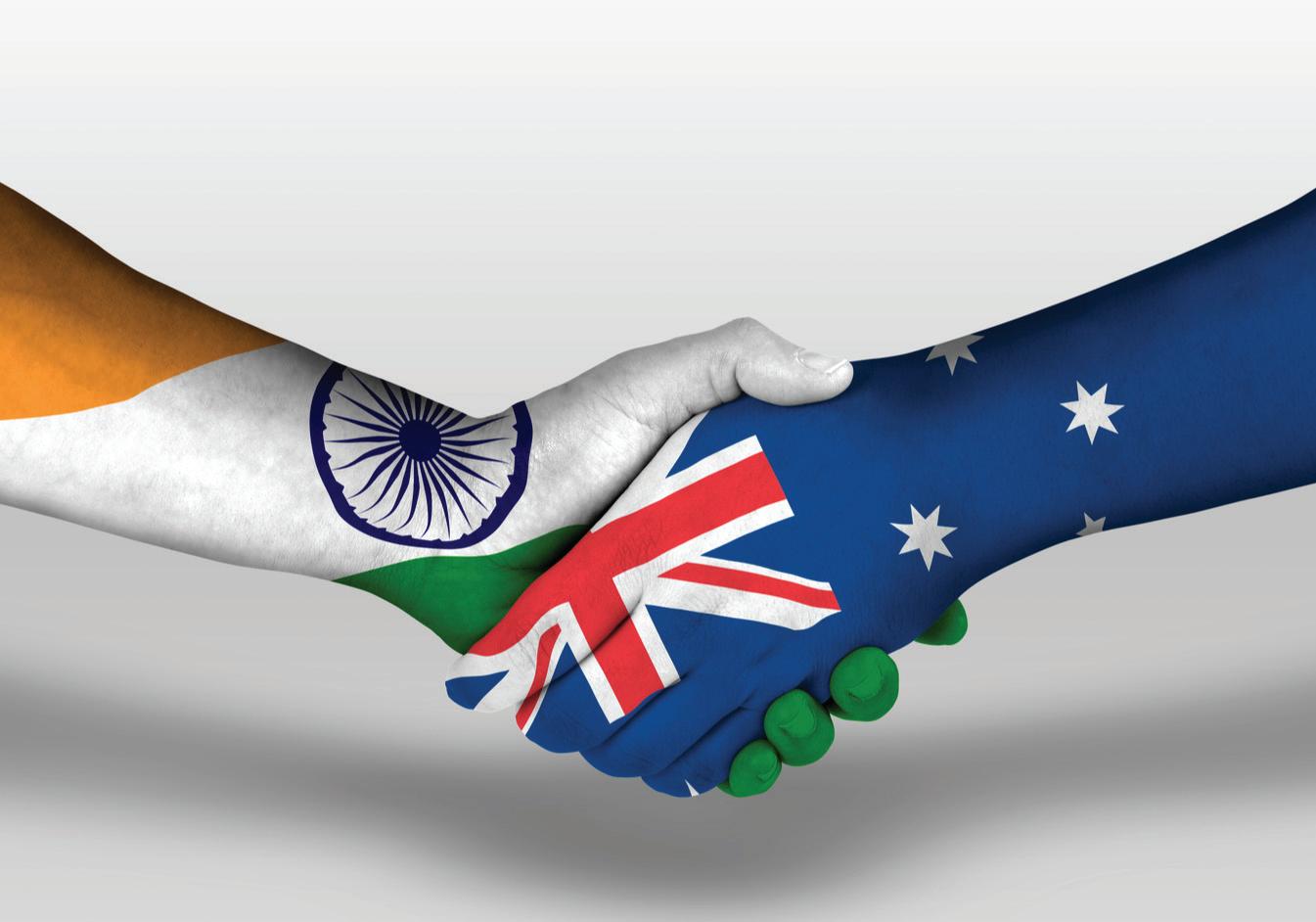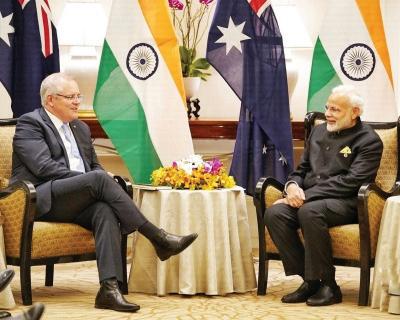
37 minute read
World News
Indian Navy, Coast Guard feeding stranded Rohingyas, but no rescue yet
By Subir Bhaumik
Advertisement
Kolkata, Feb 23 (IANS): The Indian Navy and Coast Guard personnel have been feeding and providing medical attention to a group of 90 Rohingya refugees and three Bangladesh crewmen on a boat that was stranded on high seas after it drifted into India’s territorial waters on Monday. Humanitarian groups monitoring the plight of the sea-stranded Rohingyas say the Indian sailors have given them some food and water and doctors have attended to the sick on the boat off India’s Andamans islands. “The navy doctors are on the Rohingya boat to treat the sick. “Eight of them have died since Saturday and many are suffering acute dehydration and diarohhea. But we learn that the Indians are not rescuing the Rohingyas,” said Chris Lewa of the Bangkok-based ‘Arakan Project’. “The last we heard from the Rohingyas was on Monday night when the one sat-phone on the boat was still working. Now that contact is lost. Nobody is taking our call on that sat-phone,” said Chris Lewa, who has a long association with the Rohingyas through her humanitarian project providing relief to the hapless refugees often stranded in hostile host countries or at sea. She welcomed the Indian supplies and medical treatment but appeared worried by unconfirmed reports that Indian technicians were trying to repair the boat’s engine. If that was true, she said, it would mean the Indians would not mount a full-fledged rescue mission, rather leave the boat inmates pursue their perilous journey to South-east Asia. The ‘Arakan Project’ has confirmed the presence of 65 Rohingya women and girls, five children below the age of 2 and 20 men on the boat. Since the boat’s engines stopped functioning six days ago, it has been drifting towards India’s Andaman islands from its course. But Indian navy sources said they were ‘trying to ascertain the identity of a boat that seems to have drifted into Indian waters off the Andaman coast’.

Myanmar military regime backed by China, cracks down on protesters
By Aarti Tikoo Singh New Delhi/Naypyitaw, Feb 20
(IANS): Myanmar’s military regime, which recently overthrew the democratically elected government in a coup, has intensified its crackdown on pro-democracy protesters in the country. On Saturday, several users on social media who claimed to be the citizens of Myanmar posted shocking pictures and videos of military repression against the protesters at Yadanarpon Dock in Mandalay. Earlier this month, the Myanmar military imposed a one-year state of emergency after detaining democratically elected leader Aung San Suu Kyi and others. The military junta, which ruled the country through the 90s and 2000s, has had the backing of the Chinese Communist Party (CCP). After a long struggle against the military regime for nearly two decades, Suu Kyi had led Myanmar’s transition to a partial democracy in the last five years. For CCP, Myanmar is of strategic importance due to its access to the Indian Ocean, the main route for China’s oil imports from the Middle East. Beijing is keen on the development of overland routes for oil and gas pipelines via the Kyaukphyu special economic zone (SEZ) and deep-sea port, which will allow it to bypass the South China Sea where the US and Japan are challenging its sovereignty. A Reuters photographer Soe Zeya Tun on Saturday posted a video of a wounded woman seen after the police crackdown on the protesters. Protesters posted pictures of injured victims and sharp irons, reportedly thrown at them by police. Civilians tweeted saying that the police had arrested some of the protesters too. The information regarding the military and police brutality trickled out from Myanmar on social media as the regime is preparing to bring in a tough cyber bill to censor free speech online. According to sources, the CCP is helping the Myanmar military regime with the technology to control information and quell protests. The CCP has expertise in using technology to locate, identify and penalize dissidents. As per the new censorship rules, internet service providers in Myanmar are required to share critical information to authorities in cases that threaten the country’s “sovereignty and territorial integrity.” A violator can go to jail for up to three years and will have to pay a fine up to $7,500 or both. Incidentally, following the military coup in Myanmar, Chinese and Indian troops disengaged along the Line of Actual Control in eastern Ladakh after a 10-month long face-off.

Tanks, choppers deployed in Ladakh part of counter terror drills with US
By Sumit Kumar Singh Mahajan (Rajasthan), Feb 25
(IANS): Two Apache helicopters hover over a recreated combat area in Thar desert as troops slither from four Mi-17 transport choppers in batches of two during the India and US armies joint drill at Mahajan Field Firing Range on Saturday. Minutes later a Chinook, a multi-mission helicopter, comes carrying an armoured transport vehicle, drops it at the designated location and leaves. The hovering Apaches also stop. The troops are on the ground and now they are ready for action. During the drill, mock terror situations like in Afghanistan and Iraq were created at Mahajan Field Firing Range and counter terror operations were carried out by a joint team of Indian and US Armies. Tanks and air power deployed at the Line of Actual Control in Ladakh -- after the border dispute with China -- are now part of the drill. Rajasthan’s Suratgarh based Brigade represented by 11th Battalion of Sapt Shakti Command of Jammu and Kashmir Rifles carried out counter terrorism drills with the Seattle based soldiers of the 1st Stryker Brigade Combat Team, also known as “Ghost Brigade”. The 1st Stryker Brigade Combat Team earned its name as Ghost Brigade for carrying out counter terror operations stealthily in Iraq. Major Spencer Garrison of the Ist Stryker Brigade told IANS, “We gained the reputation as Ghost Brigade in early 2003 during first deployment in Iraq. We gained the reputation for quickly and quietly entering enemy town homes in certain areas and we were able to strike and defeat the enemy before they knew what hit them. From then on our motto became ‘Arrive in Silence’.” He said that it is a Brigade of over 4000 soldiers from various military specialities. During the drill the joint team move towards a built up area, a village, were militants are hiding. Troops with long range and short range guns along with Infantry Combat Vehicle BMP and T-90 Bhishma Tank, Stryker Armoured Vehicle and troops use their firepower in a coordinated manner. Thereafter searches were carried out to trace the militants. During the mock counter terror operation, fire support was given by Army Aviation. Four Indigenously Advanced Light Helicopter (ALH) Rudra hit the targets with missiles. The drill culminated with destroying the militants hideouts. It is the 16th edition of Exercise Yudh Abhyas, a bilateral exercise. It started on February 8 and will end on February 21. The drill is named Zorawar after Dogra military commander General Zorawar Singh who is known as ‘Conqueror of Ladakh’. The focus of the drill is on counter terror operations. Apart from that both the countries’ militaries are carrying out familiarisation and handling of weapons, battlefield trauma management, casualty evacuation, tactical level questioning, intelligence collection, tracking and interrogation techniques and counter IED drills. A total of 240 soldiers of the US army are part of the exercise.
Biden’s Indian-American cabinet nominee runs into Senate opposition
New York, Feb 20 (IANS):
President Joe Biden’s IndianAmerican nominee for a cabinet post is at risk of not getting the Senate’s approval after a Democratic Senator announced he would not vote for her. Joe Manchin said on Friday that he will oppose Neera Tanden’s nomination to be the director of the powerful Office of Management and Budget citing her history of attacking leaders of both Democratic and Republican parties. A loyalist of former Democratic Party presidential candidate Hillary Clinton, she had alienated both Republicans and Democrats with her caustic tweets which have now come back to haunt her. Appointments of members of the cabinet and senior officials have to be confirmed by the Senate. Despite the red flags, Biden had nominated her in expecting that she would sail through the chamber with the vote of all the 50 Democrats and the tiebreaking vote of Vice President Kamala Harris as the Senate president. But that calculation has been upended by fellowDemocrat Manchin. It seems unlikely that any Republican would support her nomination in the evenly divided 100-member Senate. However, Biden stood firmly by Tanden saying a firm “No”, when reporters asked him if he would withdraw her nomination. His Spokesperson Jen Psaki said, “Tanden is an accomplished policy expert who would be an excellent Budget Director and we look forward to the committee votes next week and to continuing to work toward her confirmation through engagement with both parties.” Defeat of Tanden’s nomination would mark the first defeat for Biden in the Senate, which has so far approved seven appointees with the support of many Republicans. They include the secretaries of state, defence, treasury and homeland security. It would also point to the rough road ahead for Biden in keeping all the 50 Democrats in his fold to get the budget and some other legislation through. Tanden has apologised for her tweets telling the Senate Homeland Security Committee last week, “I deeply regret and apologise for my language and some of my past language.” At that committee’s hearing Republican Senator Rob Portman brought up some of her tweets. She faced an embarrassing situation when she appeared before the Senate Budget Committee, which is chaired by Senator Bernie Sanders, an independent aligned with the Democrats who had run for that party’s presidential nomination against Hillary Clinton in 2016. As an adviser to the Clinton campaign, Tanden had made personal attacks on Sanders. Republican Senator Lindsey Graham brought up a tweet by her accusing Bernie of being helped by Russia a” a charge that that had also been made against former President Donald Trump. She admitted, “I must have meant them, but I really regret them.” Sanders has not indicated how he would vote, but during the hearing the leftist leader grilled her about the donations of 33 million the Centre for American Progress that she headed had received from big business. She has admitted to deleting more than 1,000 tweets in November 2020 around the time Biden had named her to be OMB director. If her nomination were to be approved by the Senate, she would be the second IndianAmerican to serve on the US cabinet. The first was Nikki Haley, who was given a cabinet rank by Trump when she was the US permanent representative to the United Nations.

Biden urges Senate to quickly pass $1.9trn relief package
Washington, Feb 28 (IANS) US President Joe Biden has urged the Senate to quickly pass the $1.9 trillion Covid-19 relief package, which was approved by the House on Saturday. “Now the bill moves to the United States Senate where I hope it will receive quick action... we have no time to waste,” Biden said at the White House on Saturday, Xinhua news agency reported. “If we act now -- decisively, quickly, and boldly -- we can finally get ahead of this virus. We can finally get our economy moving again,” he said. “And the people of this country have suffered far too much for too long. We need to relieve that suffering,” said the president. “And it’s time to act.” US Treasury Secretary Janet Yellen also said on Saturday on the Twitter that as an economist and an American, she applauds “the House’s favourable vote on the American Rescue Plan.” “There’s a broad consensus among economists: People need more help putting food on the table and keeping a roof over their head until the virus is under control. This plan does that,” she said. The rescue plan contains direct payments of $1400 per person for working families, which is on top of the $600 check in the $900 billion relief package approved in December. It would also boost federal unemployment benefits to $400 dollars per week and extend the measure through the end of September. The House-approved bill also includes a provision to raise the federal minimum wage to $15, which would face tough tests in the 50-50 split Senate, where parliamentarians have ruled that the wage increase violates the budget reconciliation process and cannot be included. The Senate is set to tackle the bill next week. Senate Republican leader Mitch McConnell on Saturday blasted Democrats over the House passage of the relief package, calling it a “deliberately partisan process”. “House Democrats snapped that bipartisan streak. They jammed through a bill that even liberal economists and editorial boards say is not well targeted to this stage of the fight,” McConnell said.

Thailand starts Covid-19 vaccination
Bangkok, Feb 28 (IANS) Thailand on Sunday started its Covid-19 vaccination roll-out, with the first shot, using China’s Sinovac vaccine, going to Deputy Prime Minister and Public Health Minister Anutin Charnvirakul. Thai Prime Minister Prayut Chan-o-cha presided over the event at the country’s infectious disease institute, where other officials, including deputy public health minister, agriculture minister, culture minister and deputy education minister, were also vaccinated with the Sinovac vaccine, Xinhua news agency reported. “It’s a historic day and a day to help the country rebuild confidence against the pandemic,” Prayut told reporters after all the recipients of the vaccine ended their 30-minute observation period and had shown no adverse reaction. Also on Sunday, 159 people in Samut Sakhon province, the epicentre of the country’s new wave of an outbreak that erupted in mid-December, are scheduled to receive their first shot of the vaccine. These included local officials as well as representatives of at-risk groups such as medical workers and migrant workers. On Wednesday, Thailand received its first batch of Covid-19 vaccines, 200,000 doses from China’s Sinovac, which were then distributed to 13 provinces, including the capital Bangkok. An additional 1.8 million doses are scheduled to arrive in March and April.


WORLD THIS WEEK
Contributed by the National Institute for Advanced Studies, Bengaluru
Compiled by Sourina Bej, Avishka Ashok, Rashmi Ramesh and Approva Sudhakar
Iran: The new US offer to restart a dialogue
What happened?
On 17 February, the NATO defence ministers met to address NATO’s missions in Afghanistan and
Iraq, review progress for a fairer burden-sharing, and discuss the NATO 2030 initiative in their two-day virtual conference. The ministers also met with their NATO partners Finland, Sweden, and the European Union to address the shared security challenges. The important outcome from the conference has been US President Joe Biden’s reaffirmation to NATO. On 19 February, Biden told at the online session of the Munich Security Conference: “The United States is fully committed to our NATO alliance, and I welcome your growing investment in the military capabilities that enable our shared defenses.” “An attack on one is an attack on all. That is our unshakeable vow.” This was Biden’s first speech on the international platform after winning the election. On 17 February, the NATO Secretary-General Jens Stoltenberg said: “This is our first meeting with the new Biden administration and an opportunity to prepare the NATO summit in Brussels later this year.”
What does it mean?
The meeting charts the course for a probable future relationship between the European leaders and the US within the alliance. Though Biden made a passing reference to NATO budgetary contributions, the issue of sharing burdens and defence spending is not likely to outrightly smoothen a wrinkled relationship. Biden has made it clear for the NATO members that China along with Russia should be on any future agenda for NATO. Thus, one could anticipate a strategic blueprint for NATO in maintaining its relation with China. The alliance may not simply return to an old-world order while the transition for NATO will be an important marker to watch for in 2021.

What happened?
On 18 February, the United States offered to restart talks with Iran on the JCPOA. The Secretary of State Antony Blinken held talks with the officials of the European countries that are party to the agreement and stated that the US would return to it formally if Iran treads the path of compliance. The US State Department signalled that Washington was ready to hold “informal talks” with Iran, on the invitation of one of the European countries. On 19 February, in response, the Iranian Foreign Ministry spokesperson tweeted that the country stood firm and would agree to compliance only when the US lifts the sanctions imposed on it by the Trump administration.
What does it mean?
First, an emerging space for diplomacy with Iran. There have been indications of talks and negotiations from the US, E3 and Iran. Both Iran and the US, despite stringent stances, have expressed their willingness to restart talks that are mediated by one of the European countries. The US’s formal call for talks will induce a new lease of life to the nuclear deal and the larger question of US-Iran relations. Second, Biden’s policy choices. While there is a significantly large section demanding a more nuanced approach, there are stronger voices within the US that do not want to soften its stance on Iran. He risks being tagged as a pro-Iran president and angering the US’s strong allies in the region- Israel and the Arab countries. Iran, therefore, is a difficult nut to crack for Joe Biden.
Munich Security Conference: Biden’s commitment, Discussion on withdrawal from Afghanistan, the Russia threat and NATO in 2030
ALSO IN NEWS
China: Foreign Ministry justifies the ban on BBC
On 18 February, the Chinese Ministry of Foreign Affairs stated that revoking BBC World News’ license was reasonable and lawful considering UK’s ban on CGTN. The Ministry spokesperson addressed the ban on CGTN and called it outrageous and unreasonable. She also accused BBC of producing fake reports and spreading false information against China.
Hong Kong: Two pro-democracy legislators plead guilty at trial
On 16 February, nine activists who were charged with organizing and participating in the biggest prodemocracy protests were brought to stand trial in the Hong Kong High Court. The two individuals who pleaded guilty were former Hong Kong Legislators who were charged for their association with the illegal assembly against the State. The remaining seven, including Jimmy Lai and Martin Lee, a pro-democracy legislator, have pleaded not guilty. A few others who have been accused rallied against the court with banners that read “Peaceful Assembly is Not a Crime; Shame on Political Prosecution.”
Myanmar: Protests against the military turn violent
On 14 February, the military amended law on privacy and security rights, allowing the police to detain its citizens without a warrant and also tap into their communications. On 16 February, a secret closed-door trial against Aung San Suu Kyi began without prior notice to her defence attorney. Suu Kyi has been accused of violating import restrictions and COVID-19 restrictions which may land her in prison for a total of six years. Thousands of people continued to protest creatively against the military by blocking roads with cars, walking slowly, hacking government websites and emptying military-controlled banks. On 20 February, at least two people were killed as the police used live ammunition to disperse the crowd. The Junta has also banned the national and local news channels from using the term “Junta” and “regime in their articles and illegally brought changes to the colonial-era Penal Code
Australia: Quad members meet virtually to discuss Myanmar
On 18 February, the members of the Quad group, Japan, India, Australia and The US met virtually and discussed issues of maritime security, terrorism, countering disinformation and restoring democracy in Myanmar. The Ministry of External Affairs revealed said, “In the discussion pertaining to recent developments in Myanmar, the upholding of rule of law and the democratic transition was reiterated by India.” The ministers also pledged to meet annually at the ministerial level along with regular meetings at the official levels and promised to work towards and free and open Indo-Pacific.
India: Government takes foreign diplomats on Kashmir tour
On 17 February, over 20 foreign diplomats visited the disputed Kashmir region for the third time
since being stripped of its ‘semiautonomous’ status in 2019. The diplomats were taken around the region amid tight security and held meetings with the recently elected village councillors. The people shut their businesses and shops to portray their discontent against the government. India: Prime Minister Modi introduces health diplomacy at a regional workshop On 18 February, Prime Minister Narendra Modi addressed a workshop on ‘COVID-10 Management: Experience, Good Practices and Way Forward’ with nine neighbouring nations. At the workshop, he suggested the creation of a special visa scheme that would enable the healthcare workers and professionals to travel quickly within the region during emergencies. He also suggested creating a regional air ambulance for medical emergencies and a platform to collectively study the effectiveness of vaccines on populations.
Sri Lanka: Imran Khan’s Parliament address cancelled a week before the visit
On 16 February, the Sri Lankan government cancelled Imran Khan’s Parliament address in a last-minute move citing COVID-19 constraints. Imran Khan will be visiting the country on 23 February and this will be his first visit to the country after assuming office in 2018. The two countries are looking forward to signing multiple agreements aimed at strengthening economic partnership and improving connectivity between each other.
France: Legislature passes antiradicalism bill
On 16 February, the lower house of the French Parliament passed the ‘Supporting respect for the principles of the Republic’ bill to strengthen surveillance over mosques, schools and sports clubs. The bill aims to safeguard France from Radical Islamists and promote respect for French values. The passage of the bill has been contested by many who fear that the state is pointing fingers at Islam.
United States: NASA Mars Rover lands successfully
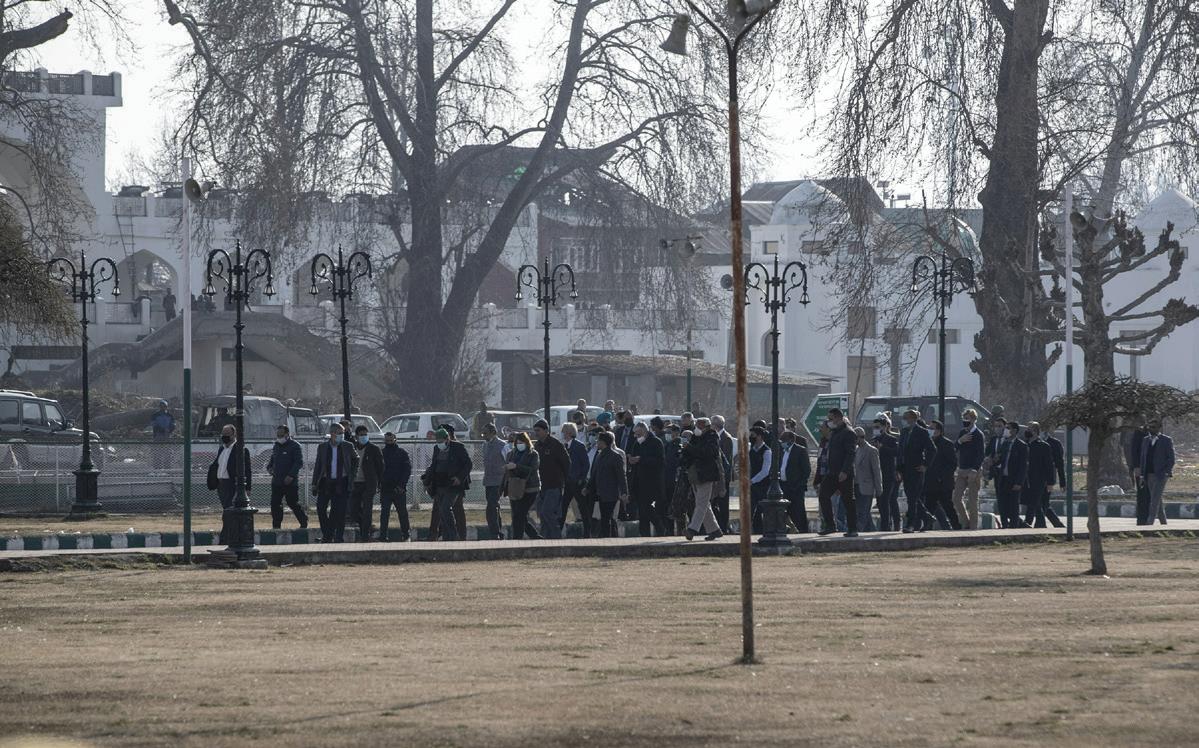


On 18 February, NASA successfully landed its fifth robotic rover on the red planet. The most technologically advanced rover will spend two years on the planet and will explore the surface thoroughly. The rover also consists of a small helicopter which will make history as the first flight on another planet if there are no technical difficulties. The rover is as big as a small car, weighs around one ton, has a robotic arm with a camera, a chemical analyzer and a rock drill.
About the authors
Rashmi Ramesh is a PhD Scholar, Apoorva Sudhakar is a Research Associate, Avishka Ashok is Research Assistant, in the School of Conflict and Security Studies at NIAS. Sourina Bej is an Independent research scholar. The report has been modified by India News due to space considerations.
Women - Silent, Powerless and “Lost in the Kitchen!
By Ms Priyam Sinha
If there is one thing I love, it is an untold story. History is told through the eyes of those who hold power and authority. And while we are acutely aware that women have power, they rarely possessed it to narrate their story. They were compelled to take a backseat and hear their story being narrated. On International Women’s Day, one inevitably celebrates the journeys of public icons who dared to navigate a road not taken. Amidst those journeys one usually forgets to take a sneak peep intothe diaries of those women who were silenced, shunned, and denied from manning the front. The domestic chores performed by women, disproportionate amount of time spent by women in performing care work in comparison with men and gendered social norms have denied women an equal footing in the social realm. Moreover, even when they do pursue their dreams and professions in a collaborative venture within family businesses, they are given an instant backseat. Hawker centres in Singapore are one such trend since the 1980s which has established its distinctive global identity. Hawking was initially viewed as a nuisance in Singapore but with the sudden increase in foreign migrant workers in the island nation it emerged as the most cost effective and viable source of employment and entrepreneurial ventures. It very well fits within the multicultural model of Singapore with each stall putting up food representative of the country. Most of these stalls are run within family networks with each member being designated tasks for providing efficient services especially during its rush hours. Even within families owning stalls it is common to spot couples running the stall together with one doing the talking and the other in the background, often performing chores. But who decides that and what does it convey? The following poem is inspired from the interaction with one such couple owning a stall serving Indian food in Singapore. Her husband spoke on her behalf and she smiled helplessly agreeing to all he said and following his instructions. He confidently asserted “Look at my wife there. She is an entrepreneur now as I helped her set this stall up in Singapore.” Can you spot her voice? A voice that I could not hear, and a voice that was silenced under patriarchal construes of supremacy that remains unaccounted for. Is she independent to take her own decisions? Are they equal partners in the new journey they decided to undertake together? Lost in the Kitchen! (Inspired from the interview of a couple at the Hawker Centre, Singapore She smiled at me, Not like she didn’t seem interested to narrate her story. I was all ears to hear her out, Her story of agony, despair, humiliation, and invisibility. But he spoke on behalf of her, Her eyes were gloomy looking at me. Her strength lies deep within, but she was silenced. She worked harder than the man at the cash counter, She woke up early to make the batter for hot idlis, And stayed up late to do the dishes. Yet she was the woman who did the chores, Unaccounted, unacknowledged and disregarded. She was asked to go in, ‘Do the dishes, heat the rice and I will attend to the customers’ he said. She stood, feeling embarrassed and walked in, Teary eyed, pretending to do the dishes. She glanced into my eyes, Wanting to be heard, feeling dejected and wondering why she was not allowed to speak. Was she born to make idlis and do dishes? Was she nothing but someone’s daughter, wife and mother? Would her son too grow up one day and treat his wife this way? Is it the story of every woman? A saga that will remain confined within the four walls of a kitchen. She battled conflicting emotions, She wanted to walk out of the kitchen and shout out saying she has had enough. But then she was pulled back, back to the kitchen that reminded her, It’s her place and there will be no one to come back to once she leaves. Yet again, she remained silent, Did the dishes, placed them by the stand and left for home. Once again to prepare dinner for her family, Since she was the mother and the wife. Nothing more and nothing less, And such is her life. She served the hot rice on everyone’s plate, with lentils and pickle, Gleefully watched them eat and barely took anything on her plate. No one noticed what she ate, if she ate, Another day passed by, Nothing had changed, Nothing will change, Her silence in the kitchen and tears went unnoticed. She was yet again the last one to go to bed and first one to wake up, Yet she was the one silenced and kitchen is her place.
Ms Priyam Sinha is a PhD candidate the Faculty of Arts and Social Sciences at the National University of Singapore

“I can hear the roar of women’s silence”, Thomas Sankara once said. Women in every part and corner of the world are now making their mark and setting the bar high. In a patriarchal world they are fighting their way to rightful and muchdeserved place on the high table challenging stereotypes. They are changing the world for the better and accomplishing herculean undertakings, where others would not dare to tread. INDIA NEWS
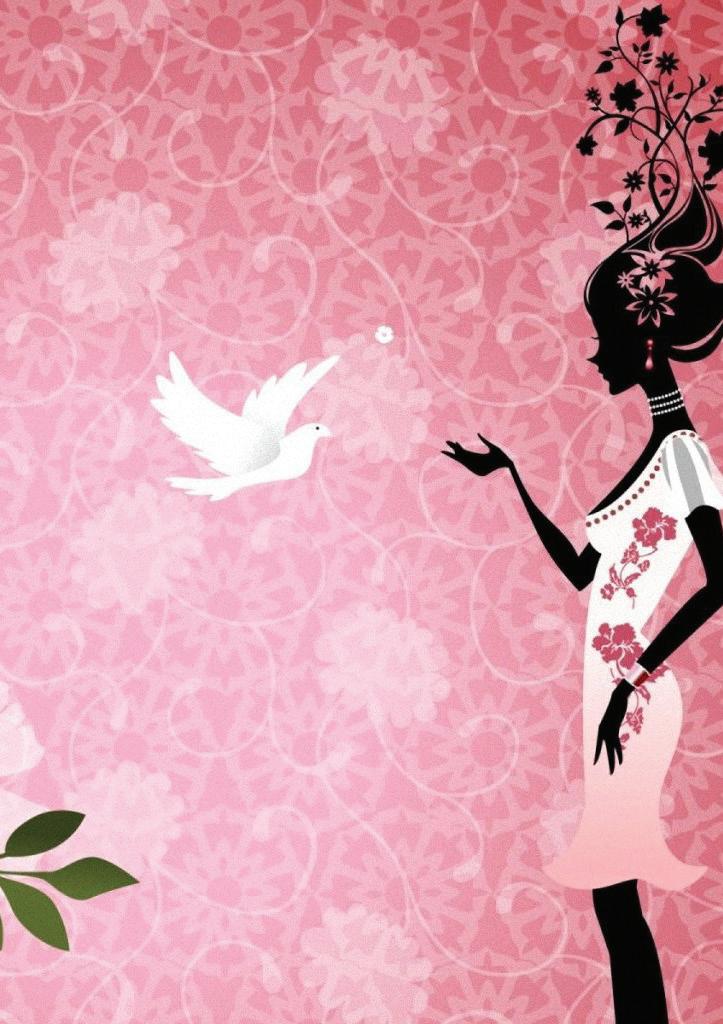

Shruti Kotwal: The Queen of Speed
It takes courage to walk in an uncharted territory, to dream of the beyond and more. It takes courage to absorb criticism and emerge as a winner while the world expects you to falter. But for some, Life is a challenge worth taking head on. Being courageous is second nature to her and there is no sign of her slowing down anytime soon. Our Naari for today is an exceptional example of dedication, hard work, patience and of course, speed. Our nation might have failed to recognise her talent but not the world. A selftaught athlete and an aspiring Olympian, she is none other than the Queen of Speed, India’s first female ice speedskater, Shruti Kotwal.
A seven-year old’s dream.
Shruti started roller skating at the age of seven. As she grew, she started showing her natural athletic traits and evolved her hobby into her passion. Having won numerous gold medals in the national roller-skating competitions in India, Shruti was already shaping her future to represent India at the Olympics. Her dream, came to an abrupt halt after she realised that roller skating as a sport was still not recognised as an Olympic event. Not willing to give up on her aspirations, Shruti made a crucial decision that would change her future.
Shimla, 2008
Not many in India know about the National Winter Games hosted in Shimla. It is the only place in India with a natural ice-skating rink and also the only place in India for aspiring ice speedskaters to practice once a year. In 2008, Shruti participated in her first-ever National Winter Games and made up her mind that if she were to represent India at the Olympics the only way would be through ice speed skating. The young woman was aware of how similar and yet how technically different roller skating and ice speed skating were, but she was willing to put in the effort, knowing how underdeveloped facilities were for such a sport in India. With this goal in mind and driven by her unwavering will power Shruti embarked on her journey of making history.
One gold at a time
A natural athlete is adaptive in nature and a great athlete uses the same to bring out the best in their performances. Shruti chose to learn with whatever resources were available and performed with every ounce of her sweat and grit. With very little practice on ice, Shruti was shadow training with roller skates back in her hometown Pune to prepare for the championship. The result of it? She bagged her first-ever gold in 2009 in Ice Speed Skating at the National Winter Games, Shimla. This was just the beginning for the Queen of Speed and she consecutively went on to win four more gold medals and was soon an acclaimed National Champion.
Never backing down
Shruti Kotwal has always been very focused and diligent with her craft. She knew being a National Champion wasn’t her final destination and there was still a long way to go. With very little guidance and mentoring available, Shruti was her own coach, but fully aware that at some stage she will need to unlearn her methods and be coached professionally. 2011, was another turning point in her life. She claimed three gold medals at the South Asian Championship held in Dehradun in the 500m, 1000m and 1500m races. This was her first international achievement and also an endorsement that would take her a step closer to her goal. Shruti was already breaking her national records when she gained attention of the International Skating Union and was offered a scholarship to go to Germany.
Making History
Germany was a reality check for Shruti which made her realise that she needed a lot more time and training to be able to qualify for the Olympics. There she met her then-coach Jeremy Wotherspoon, the Canadian ice speed skater, who agreed to continue coaching her in Calgary, Canada. With no sponsorship, it was a gamble for the athlete to move overseas and continue her training. She shares that it was with the support of her family that she could take such a leap of faith and pursue her dreams.
Winning the Gold
Shruti is now training for the qualifiers of the Skating World Cup which will bring her a step closer to representing her nation, India at the Winter Olympics 2022. The life of an athlete is laden with enormous challenges, and it requires a lot of discipline, strength, will power and faith to come out as a winner. But more so, life as a female athlete whose trying to achieve that no Indian has ever accomplished before, is even tougher. Shruti Kotwal is not just aspiring to bring the title home but she is also giving rise to hope for those young girls back in India that need inspiration and a role model to help chase their dreams. India News salutes and honours the courage of the Queen of Speed, Shruti Kotwal and is proud that she is the first-ever female Ice Speed Skater of India.
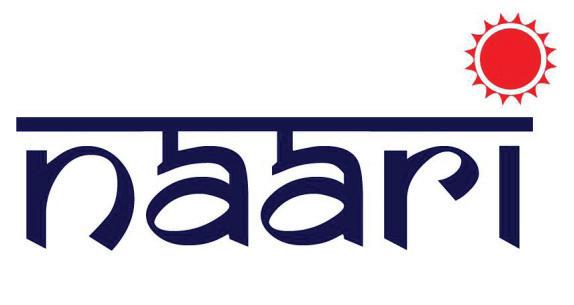
brings to you inspirational stories of some of the extraordinary women among us displaying grit, kindness and leadership of the highest variant.
NAARI is a column envisaged by INDIA NEWS Consulting News Editor Ananya Dhyani paying tribute to women leaders among us who are changing our world without much salutation that they deserve. It is our humble initiative to say ‘thank you’ to them.

By Aditi Bhaduri
The year began on a subdued note with the assassination of journalist and activist Karima Baloch, one of Balochistan’s few, fiery and brilliant women freedom fighters. Her dead body was found in a lake in Toronto, Canada. The death is strongly alleged to be that of the Pakistani deep state. It, however, did not ignite international passions as the farmers’ protests in democratic India did, for example. Yet, this was not a one-off assassination. It was part of a broader pattern of continuous death, destruction and dispossession of an entire community by the very state that is meant to protect and ensure their rights. Just in September another Baloch female journalist was killed, her perpetrators went scot-free. According to the Human Rights Council of Balochistan 18 murders and 28 people were forcibly disappeared in Pakistan’s Balochistan province in September alone. The Voice of Baloch Missing Persons states that between 2002 and September 2018, at least 6,428 persons were forcibly abducted by security agencies. Prominent Baloch tribal leaders have been assassinated, forcing yet others to seek asylum abroad. Yet, Balochistan rarely makes it to the headlines in the international media. This is what makes Balochistan: In the Cross-Hairs of History by veteran journalist Sandhya Jain a timely intervention. Jain, in great details, traces the history of Balochistan’s merger and inclusion in the state of Pakistan. Those who believe Jammu and Kashmir’s merger with India is disputed, will find Balochistan’s association with Pakistan even more tenuous. The province is strategically located: at the crossroads of Afghanistan, Iran and the Gulf, at the mouth of the Strait of Hormuz. In a cloak and dagger game, machinations of the British (for whom securing the province was essential to controlling the Gulf), the Muslim League, and its leader Mohammad Ali Jinnah, together with Baloch tribes jostling for power, the Khan of Kalat finds himself outwitted, and the territories which comprise Balochistan province today ceded to Pakistan. Thus, for instance, when Ahmed Yar Khan, the last Khan of Kalat, under tremendous pressure from Jinnah to sign the instrument of accession, when he only wanted to sign “an agreement on defence, foreign affairs and communications” summoned the Dar-ul-Awam to deliberate on the matter, it “voted unanimously for independence”. GhausBakshBizenjo made this impassioned speech: “We have a distinct civilization and a separate culture like that of Iran and Afghanistan. We are Muslims but it is not necessary that by virtue of being Muslims we should lose our freedom and merge with others. If the mere fact that we are Muslims requires us to join Pakistan, then Afghanistan and Iran, both Muslim countries, should also amalgamate with Pakistan. We were never a part of India before the British rule. Pakistan’s unpleasant and loathsome desire that our national homeland, Balochistan, should merge with it is impossible to consider...” From there follows a familiar pattern, seen in the earlier history of East Pakistan (and which ultimately decided it’s destiny as Bangladesh), in that of Pakistan occupied Kashmir, Northwest Frontier Province (now Khyber Pakhtunkhwa) -- the steady depletion of the natural resources of these provinces, the dispossession of it’s populace, the erosion of local autonomy, the negligence of development, suppression of ethnic identity and culture, demographic changes and the brutal crushing of any dissent or opposition. According to the UNDP, 71 per cent of the population in Balochistan live below the poverty line, second only to Khyber Pakhtunkhwa in the country’s poverty index. This should never have been the case. After all, Balochistan is a resource rich province, with natural gas, and mineral deposits including coal, chromites, barytes, sulphur, marble, iron ore, quartzite, uranium, limestone and 95 per cent of the world’s asbestos. Jain points out that 40 of the 50 minerals being mined in Pakistan currently are from Balochistan. Nevertheless, the province continued to languish in neglect and development, even as Baloch people alleged “internal colonization by Pakistan’s demographically, politically and economically dominant province of Punjab”. Thus, while gas from Balochistan’s Sui gas fields reached Punjab in 1964, Quetta cantonment received gas only in 1982. Never having acquiesced to its merger with Pakistan, the Baloch have rebelled periodically, with the latest ongoing round of insurgency breaking out in 2004. The Pakistani state and army have used high handed measures to quell it, which includes among other things, death squads. Unsurprisingly, the people of Balochistan have opposed Chinese and other foreign investments into the province to develop the strategic Gwadar port, part of the China Pakistan Economic Corridor -- the flagship project of China’s ambitious Belt and Road Initiative (BRI) as no local stakeholder is involved. Jain points out that at the agreement signing ceremony over which then President Musharraf and Chinese premier Wu Bangguo presided in 2002, no Baloch representative was present. Consequently, the insurgency has also begun targetting Chinese interests and representatives in the province. The Soviet occupation of Afghanistan and the ensuing jihad and civil war in that country has further exacerbated the agony of the province with an influx of refugees and arms adding to the economic duress, violence and chaos, while the drug trade of landlocked Afghanistan has introduced “drug economy” to the province. Pakistan’s support for the US war on terror encouraged its war against the Baloch as it received both funds, arms, and silence from the US in return. In fact, to Pakistan’s credit it has got silence from major quarters: Balochistan rarely figures on the radar of the Organisation of Islamic Cooperation or the Arab world, or even the EU or the UN. Turkey and Malaysia so vocal about rights of Muslims elsewhere have not uttered a squeak for the Baloch, Iran’s suppression of its own Baloch dissidents makes it a partner for Pakistan. India alone espouses the Baloch cause but with many limitations; Baloch insurgency is blamed on Indian collusion by Pakistan. Today South Asia stands at a cusp of major geo-political changes. There is the ascendancy of the Taliban in Afghanistan, US and NATO troops will soon be withdrawing from the region, the CPEC runs through Balochistan and other disputed territories, China, Pakistan, and Turkey have entered into a close alliance, each with its own view of exceptionalism, political Islam is gaining in currency, the problem of Balochistan acquires greater salience. Rich in data culled from numerous sources with an extensive bibliography Jain has done a yeoman’s service. A detailed work, the volume also delves into Baloch ethnicity, language, and culture. This is probably the author’s greatest achievement -- she has not dealt with the subject through the prism of India-Pakistan rivalry. Given the paucity of literature on Balochistan and research on it being few and far in-between this volume becomes a go-to book for a range of stakeholders and hopefully will further evoke interest in and awareness of such a critical a subject. (Aditi Bhaduri is a columnist. The views expressed are personal)

Good Girls: A tale of what it means to be a woman in modern India

By Sukant Deepak
She was in London when she saw the image of the hanging children, aged 16 and 14, circulating on Twitter. Though she had planned to write a book about the wave of sexual violence, seeing that visual of two teenage girls -- Padma and Lalli who disappeared from their home in the village of Katra Sadatganj in Uttar Pradesh, author Sonia Faleiro felt that this case, coming barely two years after the 2012 Delhi bus rape, could serve as the focus of her next book -- the recently released ‘The Good Girls: An Ordinary Killing’ (Hamish Hamilton/ Penguin Random House India). Faleiro flew down from London to Delhi and then drove six hours to the girls’ village, Katra Sadatganj, in Badaun, Uttar Pradesh, expecting to stay only a few days. But by the end of that trip it was clear that nothing was as it seemed. “I was then faced with a choice between choosing another case or digging deeper into this one. I decided to stay with the Katra case, and over the next few months it became clear that the story of the girls and of how their lives were impacted by gender, caste, politics, notions of honour, and the threat of violence, was really the story of what it meant to be a woman in modern India,” she recalls. An experienced journalist, the writer reported the case over four years and interviewed more than a hundred people, many of them repeatedly. Supplementing this material with more than 3,272 pages of official records, she says it was a gruelling process, complicated by the fact that many individuals who were central to the events of the night the children went missing and kept changing their stories. “The main challenge was to pin down a clear and accurate narrative, the writing came much later,” says Faleiro, who will be speaking during the ongoing Jaipur Literature Festival (JLF). Ask Faleiro, who also has to her credit non-fiction titles including ‘Beautiful Thing: Inside the Secret World of Bombay’s Dance Bars’, ‘13 Men’ and the fiction ‘The Girl’ if it was easy to keep herself ‘absent in the text’, and she says, “It was a conscious decision in order to allow the story to unfold naturally and to allow facts to speak for themselves.” Stressing that it is important that she is moved and intrigued enough to want to stay with the subject matter for at least five years, as that is how long it takes her to write a book, Faleiro adds, “In the case of ‘Good Girls’, I had been thinking about writing about sexual violence in India for a while. And with ‘Beautiful Thing’, I had already been writing about bar dancers, when the ban came around. I knew that I needed to chronicle its impact on the thousands of women whose livelihoods were destroyed.” Agreeing that it is not easy to move away from the many complex characters in her works once the writing is over, the London-based author says, “But it’s important in order to maintain my objectivity and also to allow myself to become immersed in my next reporting project.”







